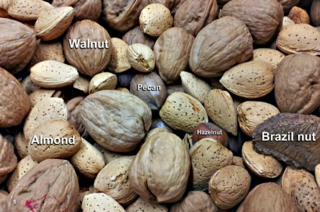6 Foods To Reduce Alzheimer’s Disease Risk
Alzheimer’s disease is the most common cause of dementia among seniors. Every person dreads having Alzheimer’s disease as they get older, especially if they have seen or lived with a loved one who had the condition. But the facts are that the risk is high in North America in particular. Up to 10% of people older than 65 years will develop Alzheimer’s disease and there are some 5.4million people with the disease in the United States. As yet there is no known measure to completely prevent Alzheimer’s disease nor cure it, although there is hope that ongoing research will eventually reveal the ‘silver bullet’ at some point.
However, there are a host of risk factors that have been associated with Alzheimer’s disease. This means that having one or more of these factors increases your chances of developing Alzheimer’s disease. Some of the factors are modifiable – like your diet and lifestyle. Others are not – like your genes. Nevertheless, reducing your risk of developing Alzheimer’s disease and possibly preventing is at the very least better than trying to treat it once it has started.
Alzheimer’s Prevention Diet
Some of the modifiable risk factors are simple to change or remove than others. It is never too early to change what you can to reduce your Alzheimer’s risk. And probably one of the simplest measures you can take is to change your diet. It has been known that certain foods, or lack of it, can increase your risk of Alzheimer’s disease or not. Food is not the only risk factor and a dietary change should be undertaken with other practices, like exercising regularly, stopping cigarette smoking, controlling your blood sugar levels if you are a diabetic and undertaking constant mental activity.
Recently new dietary guidelines for the prevention of Alzheimer’s disease developed by the Physicians Committee for Responsible Medicine (PCRM) was released. It aims at minimizing some of the dietary risk factors associated with Alzheimer’s disease. However, even the lead author of these guidelines, Dr Neal Barnard MD, has stated that these dietary guidelines should be combined with exercise and other measures like avoiding excess metals in multivitamins to maximize protection for the brain. But it is not only for Alzheimer’s disease. Many of these foods to eat and avoid can be helpful for other brain problems as it protects the structure of your nerve cells.
Minimize Dietary Fats

It is not all fats that are bad. In fact you need some fats in your diet to maintain the health of your nerves and ultimately your brain. Saturated fats and tans fats specifically should be consumed in moderation or avoided. Apart from the direct role of these fats in the development of Alzheimer’s disease which has not as yet been established, it is known that a fatty diet may have indirect effects.
One of the known risk factors for developing Alzheimer’s disease is a high blood cholesterol (hypercholesterolemia). Controlling your cholesterol levels with diet is therefore an important component in Alzheimer’s disease prevention. Another factor to consider is that a high fat diet contributes to obesity and increases the risk of type 2 diabetes mellitus which in turn increases the risk of Alzheimer’s disease.
Eat A Vegetable-Rich Diet
A vegetable-rich diet is one of the recommendations of the new dietary guidelines. But this does not mean vegetables only. It includes legumes, fruits and whole grains. It is these foods that should form the main part of your daily diet. Not only do these foods help to lower your blood cholesterol levels and are heart healthy, but it is also rich in folate and vitamin B6 which are known to play an important role in brain health. But the benefit is not only for Alzheimer’s disease. Studies have shown that a vegetable-rich diet reduces the risk of other cognitive problems as well.
Increase Vitamin E Intake

The role of vitamin E in protecting against Alzheimer’s disease is still a bit contentious. It does not hurt to increase your intake vitamin E. But do not rush out to buy vitamin E supplements just yet. Acquiring this micronutrient from healthy foods is a better options. Nuts and seeds are rich in vitamin E and just one ounce of these foods a day should provide you with sufficient vitamin E for your brain health. This is approximately one small handful of nuts and seeds. But stick to the unsalted option – high blood pressure (hypertension) is known to increase your risk of Alzheimer’s disease. Remember not to overdo it with the nuts and seeds, as with any food. Nuts and seeds are high in calories which can be a problem if you are trying to control your weight.
Plenty Of Dietary Vitamin B12
Vitamin B12 is an important micronutrient in the health of the brain and peripheral nerves. A deficiency of vitamin B12 can lead to a host of neurological problems. The best sources of vitamin B12 are meat, dairy and eggs. But these foods may not be an option for every person. Vitamin B12 is known to be necessary for health and is therefore added to many foods. Always check your favorite cereals and other common processed foods to verify that it is fortified with vitamin B12. When it comes to this micronutrient, supplements can also be helpful and if you have a severe deficiency then consider regular vitamin B12 injections from your doctor.
Caution With Multivitamins

Sometimes a pill may seem like a better option in ensuring that you get all the micronutrients you need. In the case of Alzheimer’s disease prevention, it would be vitamin B-complex and vitamin E. But be careful about the vitamins that you use. Some brands may be laden with metals such as iron and copper which can in fact compromise your efforts to protect your brain. Getting these same micronutrients from your food by eating a balanced diet daily is a much better option. But do not write off the supplements entirely. There is evidence that it can be helpful but remember to pick reputable brands and speak to your doctor about the best options on the market.
Avoid Consuming Aluminum
There is still much controversy surrounding the intake of aluminum and its contribution towards brain-related problems like Alzheimer’s disease and other causes of dementia. The fact of the matter is that most people consume small amount of aluminum. It is the third most prevalent element on the planet and is found in most animals, plants and even natural water. Avoiding aluminum entirely may not be possible but you can at least minimize the intake. You can do this by cautious about the cookware you use, not consuming excessive antacids that contain aluminum and reducing other food products that may laden with aluminum.
References:
Dietary Guidelines Aim to Reduce Alzheimer’s Risk. Medscape
Dietary Guidelines for Alzheimer’s Prevention. PCRM
Alzheimer’s Disease Fact Sheet. NIH National Institute on Aging




